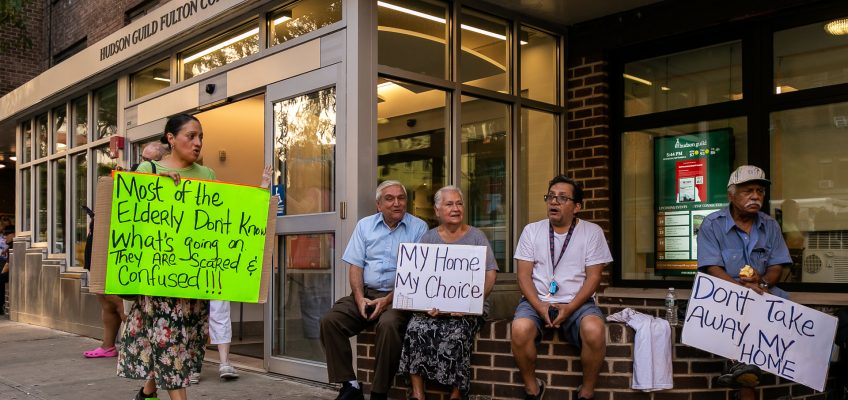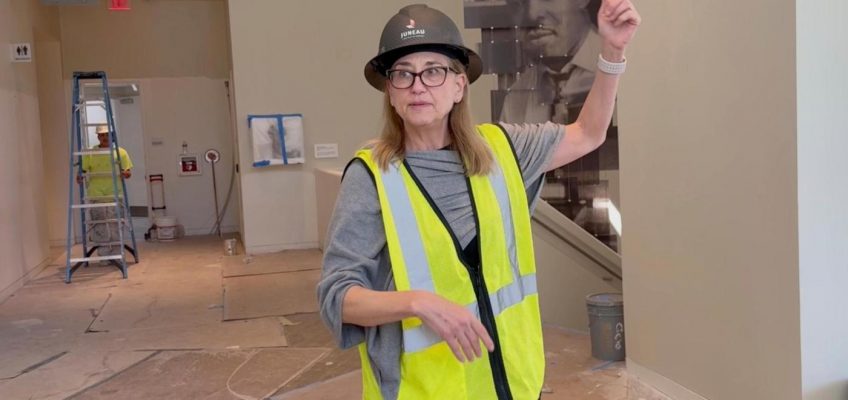Approximately 79 of the households being asked to temporarily relocate are seniors. Some faced with moving contend that it goes beyond four walls and a ceiling, but threatens the community and support networks that have sustained them through their later years.
Tenants protest NYCHA’s demolition plans outside the Fulton Houses’ community center in September 2023 (Adi Talwar/City Limits)
Chelsea Addition, a New York City public housing building for seniors, sits just blocks from Hudson Yards.
Built in 1968 and framed by evergreen shrubs, a wispy curving pine, and London Plane trees that dot the surrounding campus, it’s home to a diverse and tight-knit community of older adults, many of whom have lived in public housing their whole lives.
In the lobby, flyers advertise game nights and dance lessons in the Elliott community center housed in the same building. Residents greet each other as they come and go, holding doors or stopping to chat.
For some tenants, however, these everyday rhythms will soon change. In late July, the New York City Housing Authority (NYCHA) sent notices that residents will have to move out of their apartments within three months.
Chelsea Addition is the first of 19 buildings slated to be demolished and replaced at the Fulton and Elliott-Chelsea Houses (FEC), part of a years-long, contentious redevelopment project meant to preserve the public housing complex in Manhattan’s wealthy Chelsea neighborhood.
While most of the roughly 3,400 FEC tenants will remain in their current homes as the replacement buildings are constructed, an estimated 120 households will be relocated to other buildings in the complex and moved back once new and modernized towers are completed.
Approximately 79 of the households being asked to move are seniors. Many faced with moving contend that it goes beyond four walls and a ceiling, but threatens the community and support networks that have sustained them through their later years.
With a community center in the same building being relocated off campus during construction, residents fear losing access to critical services such as mental health counseling and social programs, and worry about the emotional and physical toll of moving.
An 80-year old Chelsea Addition resident, speaking on the condition of anonymity as they feared harassment from relocation coordinators and management, says that as a senior, her neighbors are her primary source of support. She moved to Chelsea Addition four years ago from another building on campus, where a gun fight once broke out just outside her front door.
She says she feels so safe in her current apartment that she can go downstairs to see a neighbor and leave her door unlocked. “When I got sick, people help[ed],” she said.
The woman fears what will happen if she and her neighbors are separated during construction.
“This is my family, now I have to move again and we can’t see each other even. This one move to here, this one move to here, how can we connect?” she added. “I lose my community again, this is a terrible thing, and lose my safety, peace, again, when I live with somebody different.”
NYCHA’s Chelsea Addition, a senior housing building, from which tenants are being relocated this fall to make way for demolition and rebuild. (Adi Talwar/City Limits)
The relocation plan
Chelsea Addition, the Elliott-Chelsea Houses and the nearby Fulton Houses are slated to be demolished as part of their selection for the Permanent Affordability Commitment Together (PACT) initiative. It allows NYCHA to contract with private developers to rehabilitate public housing under the federal Section 8 program, which is more lucrative than NYCHA’s traditional, long underfunded Section 9.
PACT projects are typically only focused on rehabilitation, and in 2021, Related Companies—which built the massive, glossy Hudson Yards complex further west—and Essence Development were selected to manage the rehab of FEC.
In 2024, NCYHA’s board approved a plan to tear down and replace the properties, saying the cost to fix them was much higher than initially believed, making full demolition the only viable option. Officials have also pointed to a 2023 survey which shows the majority of residents in favor of demolition, though a number of tenants have questioned its accuracy.
When the project is complete, public housing residents will be moved into six reconstructed high-rise buildings, three at the Fulton campus and three at the Elliott-Chelsea campus. The redevelopment plan also includes the creation of additional residential buildings on both sites that will house thousands of new mixed-income units—a mixture of market-rate and affordable apartments.
The Fulton Houses campus after construction is complete.
The Elliott-Chelsea campus after construction is complete. (both renderings are from NYCHA’s relocation plan)
While the majority of residents will stay in their homes until the new buildings are finished, residents of Chelsea Addition and Fulton Houses’ Building 11 will be moved into vacant apartments across the campus for a period of at least four years.
The Elliott Center, a community center located in Chelsea Addition, will also need to be relocated off-site, according to NYCHA’ s 52-page relocation plan. All residents are legally guaranteed the right to return.
Six of the buildings slated for demolition will be converted to Section 8 this fall. After that, a subsidiary of Related-Essence will be able to collect federal subsidies equivalent to market-rate rents (though tenants in those buildings, and in all others slated for future conversion, will still contribute only 30 percent of their income toward rent, as was the case previously).
Section 8 rents vary by ZIP code. For the six buildings slated for demolition, that means one-bedrooms will draw either $4,048 or $3,861, depending on location.
The developers will collect subsidies from the buildings slated for demolition for at least the next three years — a practice the tenant organization Stop FEC Demolition, which has been fighting the plan, condemned as an “act of dispossession” in an August open letter.
Tenants in Chelsea Addition Fulton’s Building 11, will begin moving into their temporary replacement units by Oct. 26. Related-Essence has contracted “relocation coordinators” from Housing Opportunities Unlimited (HOU) to manage all aspects of the moves, from disseminating notices to physically assisting residents with their belongings.
While NYCHA does not anticipate that residents will be moved off campus, the plan contends that it is a possibility if no “suitable” replacement unit can be found on site (either way, all residents will retain their right to return.)
NYCHA has identified potential replacement units, but said they will not be finalized until residents receive their 30-day move notice later in September. The relocation plan also stipulates that residents will be entitled to moving assistance and that they will continue to pay 30 percent of their income in rent after moving.
While NYCHA is legally required to replace each unit “one-for-one,” the agency has considerable discretion over unit and bedroom size, and concedes that in some cases families may have to remain in their replacement units after construction is complete if there isn’t an appropriately sized apartment for their household available.
According to the plan, residents who do not “comply” with the moving process—which NYCHA defines as refusing to move, refusing to meet with management or relocation coordinators regarding moving, or otherwise failing to “cooperate”—could face eviction. Any evictions would be carried out by the property management company hired by Related-Essence.
A December 2024 audit by the New York City Comptroller’s Office found that PACT properties have a “significantly higher” rate of evictions than developments managed by NYCHA. The housing authority disputed those findings at the time, saying that there were still “very few evictions under PACT.”
Chelsea Addition Located at 436 W 27th Dr. (Adi Talwar/City Limits)
While the FEC relocation plan states that eviction will be employed “only as a last resort,” a spokesperson for NYCHA did not respond to multiple requests for clarification on this specific policy, nor did they define what “failure to cooperate” in the moving process entails.
Of the tenants interviewed for this article, none were aware of the relocation plan or had read it, with the exception of Fulton Houses tenant leader Miguel Acevedo. Andrew Sklar, deputy press secretary for NYCHA, said in a statement that NYCHA will continue individual outreach to residents in the coming weeks to ensure their needs are met.
“The PACT partner and HOU have been working directly with the households that are required to relocate since the fall of 2024, with preliminary engagement from NYCHA, in the form of one-to-one sessions and town halls, dating back to 2023,” he said in a statement by email.
In addition to the 90-day notices handed out in July, tenants were given information about free legal assistance, Sklar added.
“Information about relocations and the plan have been provided at all resident meetings this year, most recently at NYCHA meetings on August 12 and 13. We are committed to providing a smooth transition for all residents who are required to move apartments,” he said
However, many residents have expressed considerable confusion about the process and what lays in store for them in the coming months and years.
“I think it’s very scary for elderly people to go through this trauma. What happens with NYCHA is NYCHA doesn’t explain anything,” says Alexa Aviles, a 70-year old resident of Chelsea Addition, who said she felt the previous community meetings were not helpful.
Tenants divided
Acevedo, the tenant association president of Fulton Houses, says that widespread misinformation is responsible for stoking fear among residents, particularly from those who don’t live in public housing or who aren’t affiliated with NYCHA or Related-Essence.
“You guys who are against this plan that don’t live here, you’re more than welcome to come stay six months in Fulton Houses, especially in the winter, and you’ll see how close to us being condemned we live,” he said.
NYCHA’s Fulton Houses Tenants Association President Miguel Acevedo. (Adi Talwar/City Limits)
According to the plan’s Environmental Impact Statement, FEC residents experience persistent heat and hot water outages, elevator outages, mold and leaks, in addition to other issues arising from outdated building systems, with the 20-year capital need for the complex sitting at roughly $1 billion.
Acevedo acknowledged that fear is a natural response to being told to move, but that the overall community will benefit immensely from fully reconstructed buildings, which cash-strapped NYCHA says are only possible via conversion to PACT, since the Section 9 program has been underfunded for decades.
“You put yourself in their shoes and you understand the binding issues they’re dealing with financially. Financially, they can’t afford to keep these buildings, because they can’t afford to maintain them,” he said.
Related-Essence says the new replacement apartments will boast amenities like dishwashers and in-unit washers and dryers, and that the rehab will also bring “an affordable healthy grocer, a healthcare facility, retail stores, and additional outdoor recreational spaces” to the public housing campuses.
“Why shouldn’t we live better in a community that has been gentrified in the last so many years? Now we have an opportunity to be a part of that gentrification,” Acevedo said. “A doorman, a rooftop, everything that those other units in these buildings have, we can match that and be the same as them, but it’s public housing residents.”
However, many residents anxious about relocation say that there is one fundamental aspect of their homes that cannot be rebuilt: the community they have created together and rely on for support.
Delores McClain, a lifelong FEC resident and mother of an adult child with a disability, credits longstanding community ties with easing some of the burden of caring for her son, who is not mobile.
“It’s hard enough raising a child that has special needs,” she said. “To take us out from our comfort zone when you have a child like [mine], and you have neighbors that have accepted him…that took a lot, to get people to understand.”
She says that her current apartment floods frequently after NYCHA attempted to re-model the bathroom to be ADA compliant. She says that at this point, she would move anywhere that would be able to accommodate her son’s needs, but that she wants to be able to stay in Chelsea.
“To take all of that away, now we gotta move to a new community, learn new people, learn new ways,” McClain added. “They don’t realize that they’re actually taking away people’s lives.”
Displacement worries persist
Research on the relocation of public housing residents under the HOPE VI program—a federal initiative in the 1990s and 2000s to redevelop public housing, which relocated tens of thousands of residents—has shown that displacement can have significant impacts on wellbeing, particularly by disrupting community ties.
Another study found that waiting for redevelopment often manifested in new or worsened mental health conditions for residents, particularly among those who already had existing health problems.
The senior center at NYCHA’s Fulton Houses. (Adi Talwar/City Limits)
NYCHA previously told City Limits that comparisons between the FEC rehab and the displacement experienced under the now-defunct HOPE VI program are “misguided and unjustified,” particularly since the current plan will keep the vast majority of tenants in their homes until the new ones are completed.
But for those who need to relocate, fears persist. Maria Santos, 75, a tenant of Chelsea Addition, worried about how the move will affect her neighbors, many of whom speak little or no English.
“A lot of the tenants, they’re already people that have health issues and a lot of them have gotten even worse because they’re nervous, they’re scared, and they don’t know what to do,” she says.
The FEC campus includes on-site mental health counseling at the Elliott Center in Chelsea Addition. Operated by the nonprofit Hudson Guild, the center also offers a community events space, after-school program, early childhood classroom, basketball court, and performance theater.
The center will be relocated to a location a block away from the FEC campus on 27th Street. A representative for the Elliott Center did not respond to a request for comment on how the center will continue to support residents during the transition, or whether they anticipate any disruption in services.
Many residents opposed to demolition are not sitting by passively. In early August, dozens of seniors gathered outside of Chelsea Addition to protest relocation, and members of the Stop FEC Demolition group staged a protest march on Saturday which ended in front of local Councilmember Erik Bottcher’s home (Bottcher supports the current plan).
Some residents, along with organizers affiliated with the group Fight for NYCHA, have filed an Article 78 petition, a legal action in New York that allows people to challenge decisions made by a government agency. In this case, tenants are using it to question the legality of NYCHA’s relocation and demolition plans.
Public housing tenants and advocates protesting the demolition plan outside Councilmember Erik Bottcher’s office on Sept. 5, 2024. (City Limits/Adi Talwar)
In response to the 90-day notices, they also filed a temporary restraining order, a court request to pause the relocations while their legal challenge is considered.
Luis Flores, an organizer with Fight for NYCHA, assisted the tenants in filing the petition, but acknowledged that time is running out. “We’re in a very tight predicament now because of the 90-day notice. We need to get in front of a judge, but because we don’t have a lawyer, I don’t know what that process is,” he said.
Flores says residents feel they need stronger support from those they believe can affect change, and questioned why major advocacy groups have not taken further steps to represent tenants. “It’s been very frustrating,” he said. “We feel completely alone.”
While NYCHA anticipates relocated residents will need to remain in their replacement apartments for three to four years, some seniors say that timeline feels impossible.
One resident, speaking on condition of anonymity, said many of her neighbors are elderly and in fragile health, and that being asked to move during this stage of life feels particularly overwhelming.
“Old people only have future for tomorrow,” she said. “Old people only think about tomorrow, not think about two years, three years.”
To reach the editor, contact Jeanmarie@citylimits.org. Want to republish this story? Find City Limits’ reprint policy here.
The post As NYCHA Plans Chelsea Tenant Relocations, Some Residents Ask: What Happens to a Community When You Move It? appeared first on City Limits.




